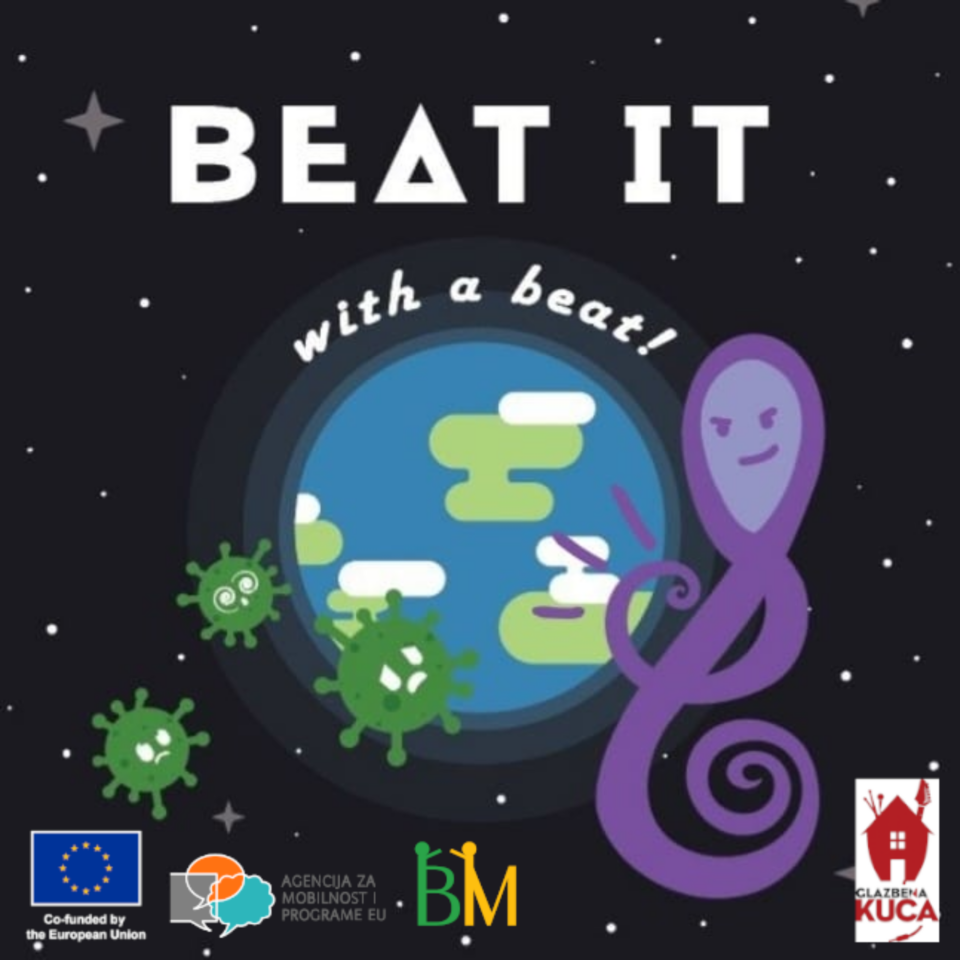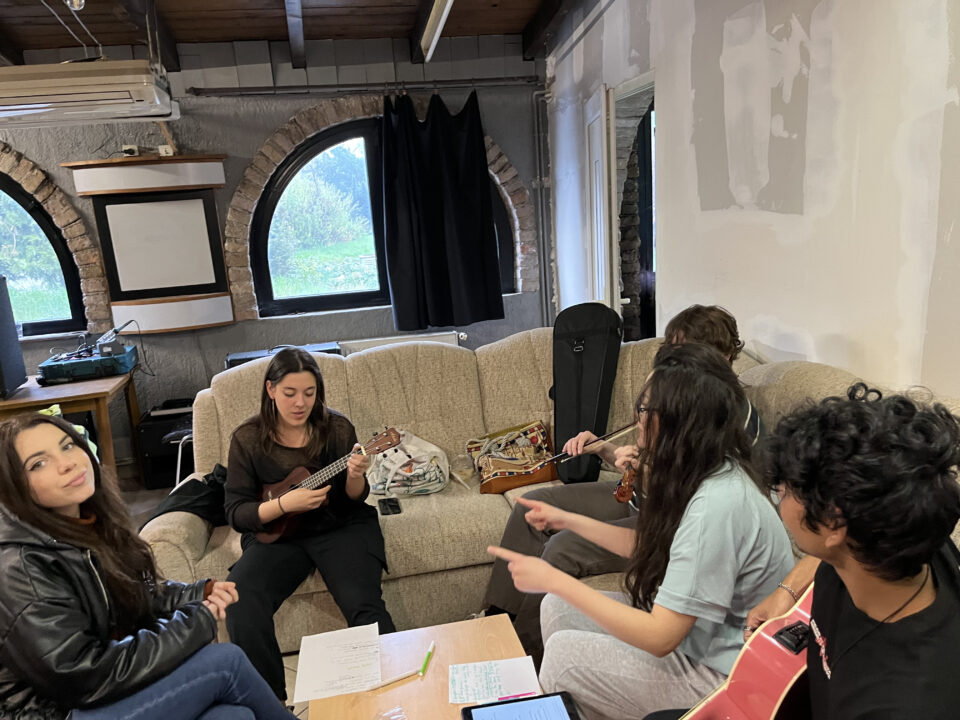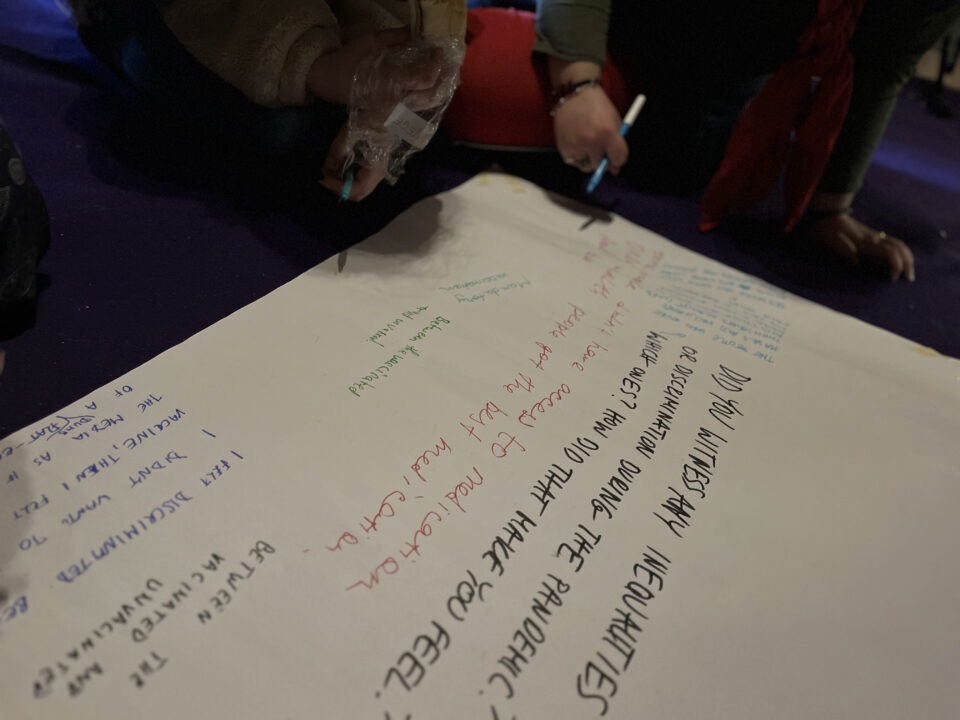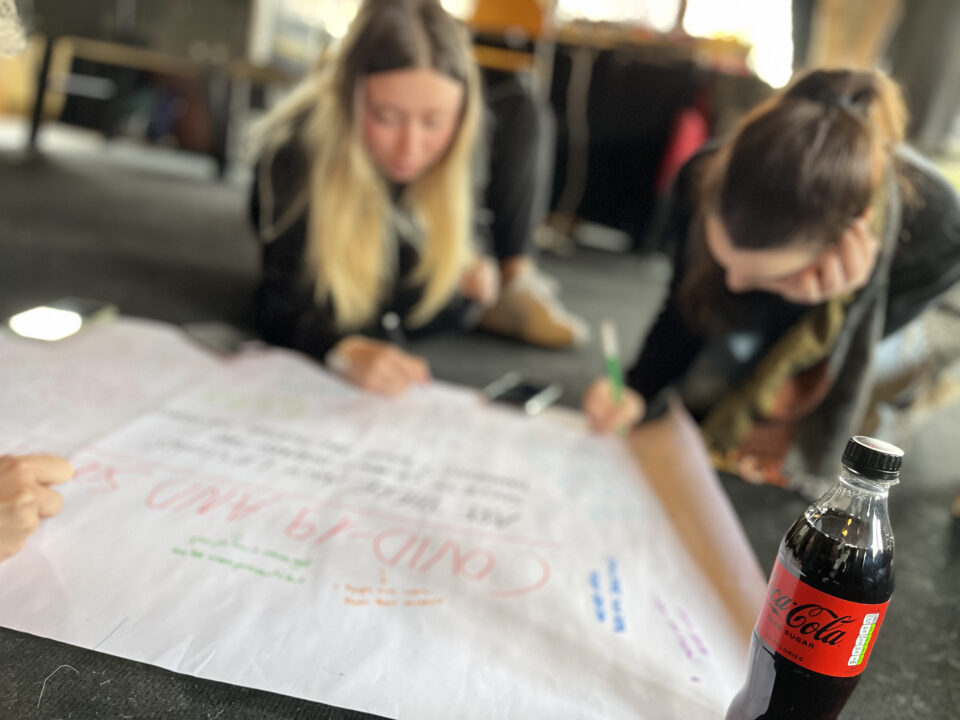From April 11th to 22th, 2023 Udruga Better Me hosted a Youth Exchange about the Covid-19 aftermath, in which young artists from organisation from Croatia, Italy, Romania, Slovenia and Hungary could process the memories from the pandemic. As results, we are proud to announce that a Brand new album made of great brand new song have been released!
Click on the picture to access the free downloading

The artwork with the lyrics of the album
But how have we reached this important goal?
First of all and most important: we didn’t apply for this project with the aim of selling an album (we released the album in a way that nor us and who will download is legitimate to monetize), but instead we wanted to give an opportunity to the participants to process the fact of the Covid-19 pandemic and their deep feeling. With this important step, we aimed also to improve their artistic skills and give them the absolute freedom to self-assess and determined their album, without major interference and censorship as organisers. In do that, it’s important:
- Describe with them what are the boundaries to adopt in songwriting: of course, blasphemy, hate speech, discrimination, racism and xenophobia aren’t compatible with Erasmus+, but using – as the participants did – words like “shit” and other explicit vocabulary has been considered as a way to express anger and frustration, without leading to any negative behaviour and negative impact on the dignity of people. Therefore, on the debate politeness vs. freedom of expression the use of explicit vocabulary prevailed under the condition of not aiming to negative impacts as described before;
- The role of the organisers was to check if these boundaries were overcame. All the lyrics are responsibility of the participants involved and the personal beliefs and ideas of the organisers are not part of the process;
- Who kept the timing and the schedule were the organisers, who encouraged the participants to deliver their recording sessions at the giving time. The project foresee three days of recording and there wasn’t space – economically and logistically – to widen up the recording sessions.
After have being clarified this point, we could go further with the description of the methodology applied for the production of this peer-to-peer album.
Methodology
1. The Jam session and the songwriting method.
As for broke the ice, each group share a pop/rock song from their Country in a way that everybody can contribute to jam to be. Then, we mixed the groups and each of them had to learn and reply one of this 5 songs.
The jam session was used also in process the memories and difficulties of living in pandemic and being in this new situation, with all the grief and sacrifices. With the activity “My Covid Story” using the method of the jam session (extemporaneous performance with the improvisation of lyrics and melody lines) for the participants to discuss and share their stories about COVID-19 using music as a tool of communication.





The session consists of a set of questions about young people’s experience with coronavirus crisis, which can only be answered with “YES” or “NO”. Accordingly, participants will move the right (YES) or left side (NO) of the meeting room. These are the questions the facilitator may ask:
1) Did you have thoughts about a friend or a school mate during the crisis?
2) Did you feel vulnerable?
3) When the crisis began, did you trust the breaking news?
4) Did you feel affected by the increasing number of contagions and casualties?
5) Did you show solidarity to someone at that time?
This is not a closed set of questions; others may come up as relevant.
With each question, after two different groups have formed with contrasting opinions, each group will try to change the other’s mind and bring them to their side by playing and singing an extemporary song.
The facilitator will set some rules such as a) the answer will be split in two turns, one for “YES” the other for “NO”), b) you’re free to switch side or to step to other’s group groove, c) be free to grab a guitar or any instrument.
In the end, we are going to debrief the activity to find topics for the first songwriting sessions.
At the end of the 1st day of songwriting, we came out with 4 songs made by splitting the group in 4 subgroups. Inspired by the activity, they arranged, composed and write the lyrics together by jamming and improvisation till they autonomous reached a compromise and consensus on the song wrote.
The 2nd day of songwriting started with the session “Folk ‘n Love” which is focused on discrimination it the time of COVID-19. After showing some examples of discrimination of minorities due to the pandemic in partner countries (press articles, news, social media etc.), facilitators will prepare 5 flipcharts with the following questions:
1) Why did these situations happen?
2) Did we become better people during the crisis?
3) How can we show solidarity to these vulnerable people and groups?
4) How would you feel and do if you were affected by discrimination?
5) How did media influence the perception of these minorities?




Each participant will answer directly by writing on the flipchart paper. Later, the facilitator will ask to form one group around each flipchart, giving each group the task of summarising the content and presenting it to the whole group. In the end, the facilitators will ask to debrief. The aim is to analyse how pandemic increased differences and discrimination and consequently injustice, allowing young people to realise the importance of solidarity.
As the 1st day of songwriting, participants came up with other 4 songs.
2.Preparation of the concert and reharsal
Really important is to leave a day before the recording of the Album: in fact an entire day was devoted for rehearse the arrangement and the instrumental and vocal parts, but also for deeper the chemical of the bands. In this phase, it’s necessary to support the young artists without compressing their attitude, self-expression and capacity. Then, the group leaders interventions were basically on vocal coaching and suggest arrangements. The aim of this phase isn’t to teach music, tough but to accompanying the participants towards a professional approach in Concerting and Arrangements. This means also support the participants in providing Stage Management tools and in On Stage Communication, learning how to engage the audience of the concert.




3.Recording in a professional studio
Mandatory is to rely on a institution (an association or a private company) that help technically to record on the click and to oversee the general quality of the recording process. The group leaders must always supervising the production but without be manipulative or directorial, but encourage them to self-evaluate the outcome and help them to develop a critical thinking and their capacity of self-assessment. Last but not least, it’s very needed to keep a timing and organising together with participants a schedule throughout the 3-4 days of recording.
Where this magic did happen? At Glazbena Kuća inside of the Zagreb Fair! And without these people, this project had a lot of probability to not being the great magic journey we had. Thank you Daniel, Andrija and all the organisation for your dedication, professionality and big heart! Rock on!


4.Choose of the artwork
As you can understand, the project relied on Communication skills and on the improvement and acquisition of new ones. In this framework choosing the artwork of an album about processing the memories of the lockdowns – and in general of the pandemic- goes to fulfil and deepen the messages and the feelings that participants want to sent to their audience. In this phase as in the others, the creativity and entrepreneurial spirit is a treasure to protect. So we can individuate three phase:
- Let them decide and craft their own artwork by using AI, programs, web-based application or simply let them draw and paint (in fact, we provide the needed for this offline method);
- let them exercise democracy by let them choose the best artwork;
- let them decide how to digitalize the chosen artwork and decide who will deliver the final result.
5.Licensing on Jamendo and release the album
Jamendo is a platform that allowed the free download, allowing the others to use it for derivate, allowing the artists and the producer to claim the paternity of the piece of heart. The useful aspect of it is that on these free options, the producers/the artists can decide to restrict of wide the freedom granted to the final user. Here For more details on Creative Commons policies.
The kind of policy we chose is:

This work is licensed under a Creative Commons Attribution-NonCommercial-ShareAlike 4.0 International License.
which means that the album:
- have an ownership: all the persons involved as participants, youth workers and producers
- that it’s possible for third interested to use the contents for derivate products (Jingle, Movies, clips and so on), with the only obligation to quote the name of the artists and the album as well;
- doesn’t give us the possibility to us and to who download the album to make money out of our efforts.
The last point is really crucial: after have produced the album, after have managed a unusual (and hard to manage) project, after have slept so little because somebody ask you to perform a solo and therefore you had to rehearse instead of relax….why don’t monetize the output?
Nice question. To follow an elementary answer.
Because the European Commission wants us who received to support to deliver outputs for free.
And all in all, the goal of the project wasn’t produce the album but encourage yet another Erasmus Plus generation to rock and to process the grieves and to look forward to these pandemic years. no?
And for make it clear, we asked our participants to evaluate the entire project in form of podcasts. Enjoy!
Thank you for have reached the end of this long article. In case you want to reply the initiative and you want to know more, contact us at betterme.croatia@gmail.com.
BEAT IT with a BEAT: always!
